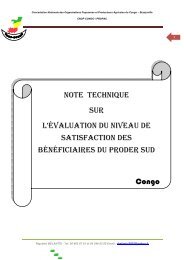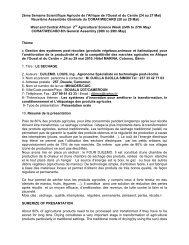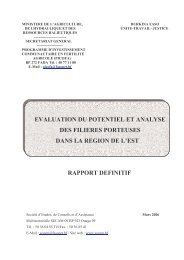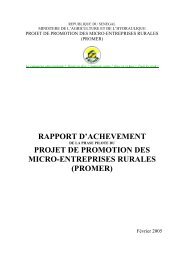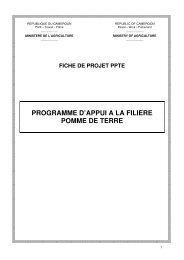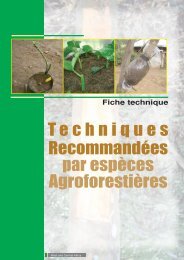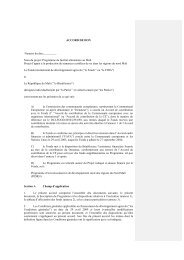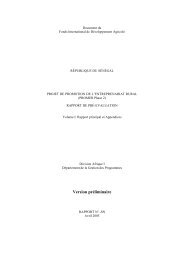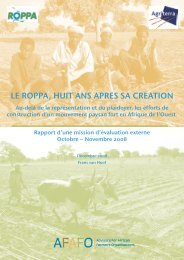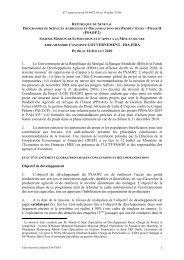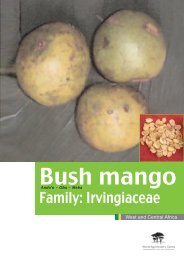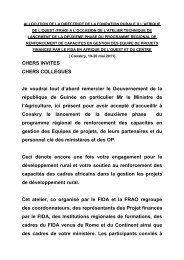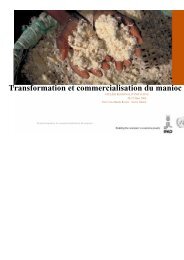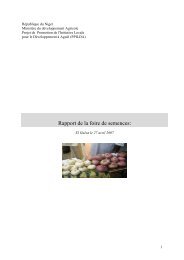Scaling Up the Fight Against Rural Poverty - FIDAfrique
Scaling Up the Fight Against Rural Poverty - FIDAfrique
Scaling Up the Fight Against Rural Poverty - FIDAfrique
Create successful ePaper yourself
Turn your PDF publications into a flip-book with our unique Google optimized e-Paper software.
engagement and <strong>the</strong> future ability of <strong>the</strong> banking sector to scale up rural lending without growing<br />
IFAD (or o<strong>the</strong>r external partners’) support remain at issue.<br />
c) <strong>Scaling</strong> up pathways – <strong>the</strong> challenge of future drivers and spaces:<br />
Looking ahead, IFAD’s vision for scaling-up its country program in Moldova appears to be one of<br />
continued support for investment credit programs, micro-credit operations and rural infrastructure<br />
support, with an additional emphasis on value chain development. The scaling up path is seen as a<br />
continued series of projects that support <strong>the</strong>se activities. Additional co-financing and parallel financing<br />
is to be sought from o<strong>the</strong>r donors, so that resources can be increased and <strong>the</strong> number of beneficiaries<br />
supported through <strong>the</strong>se programs can be increased.<br />
Continued support through additional projects will increase <strong>the</strong> cumulative number of beneficiaries.<br />
But free-standing projects alone are unlikely to build a sustainable path for scaling up. More systemic<br />
efforts are needed to establish a pathway that will lead to substantial and sustainable scaling up. In<br />
terms of drivers, <strong>the</strong> credit demand and demand for grant financed infrastructure may remain a strong<br />
force, but meeting this demand purely through IFAD resources is not a meaningful scaling up strategy<br />
in <strong>the</strong> longer term, even as <strong>the</strong> government will continue pushing for it. The challenge for IFAD<br />
<strong>the</strong>refore will be to help <strong>the</strong> government develop a clear pathway that will rely not only on IFAD’s and<br />
o<strong>the</strong>r external partners’ funding, but increasingly also streng<strong>the</strong>ns <strong>the</strong> banks’ capacity and readiness to<br />
step up lending on <strong>the</strong>ir own account.<br />
A key success factor will be <strong>the</strong> creation of a suitable policy space. So far IFAD has not taken a strong<br />
role in financial sector policy analysis, dialogue and reform. If <strong>the</strong> conditions for sustained and scaled<br />
up private sector lending to rural producers are to emerge, policy and regulatory reform will have to<br />
play a major role. Partnerships, especially with <strong>the</strong> EU and <strong>the</strong> World Bank, could be developed to<br />
build a platform for reforms.<br />
In <strong>the</strong> institutional space, IFAD’s approach has been supported by an effective PIU, which operates<br />
mostly in parallel with official government departments. The PIU manages IFAD’s directed credit<br />
programs in parallel to <strong>the</strong> government’s specialized credit line department, which handles <strong>the</strong><br />
programs of o<strong>the</strong>r external donors and <strong>the</strong> repayment from IFAD credit lines. While this arrangement<br />
has worked in <strong>the</strong> past, scaling-up ultimately requires closer alignment with <strong>the</strong> government’s own<br />
systems. Helping to build and support <strong>the</strong>se systems in areas where IFAD has a substantial<br />
engagement could be one of <strong>the</strong> building blocks for scaling up.<br />
Finally, in <strong>the</strong> knowledge space, IFAD’s engagement through M&E has been limited so far. A more<br />
systemic effort to monitor and evaluate <strong>the</strong> experience, to understand <strong>the</strong> financial sector context, to<br />
understand <strong>the</strong> poverty impact, and to prepare options for policy and institutional reforms, will be key<br />
elements of a scaling up strategy in rural credit.<br />
d) <strong>Scaling</strong> up pathways – constraints in IFAD’s operating modality<br />
A number of factors constrain IFAD’s ability to scale up in Moldova.<br />
• Project focus: IFAD’s focus on <strong>the</strong> individual project and frequent changes in design features<br />
across from one project to <strong>the</strong> next militate against attention to longer term development of a<br />
serious scaling up path. A more programmatic approach – especially in <strong>the</strong> context of COSOP<br />
preparation and implementation – could go a long way to help overcome this constraint.<br />
• Policy engagement: IFAD’s capacity for engagement on policy analysis and dialogue is very<br />
limited. Given <strong>the</strong> importance of this element for a longer-term scaling up approach in<br />
21



